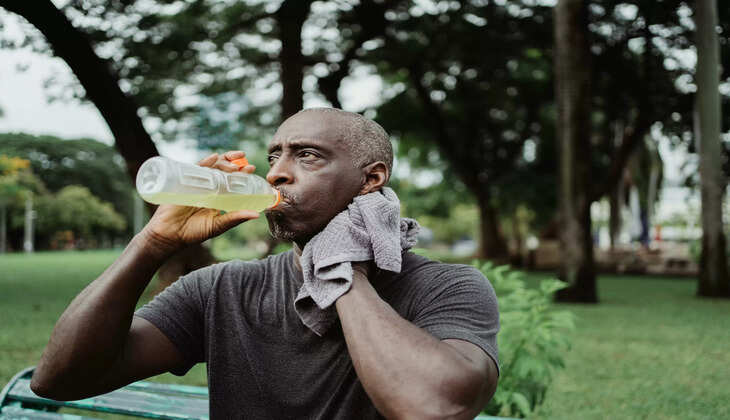What is Dehydration? How to Recover it?
May 25, 2024, 11:25 IST

Dehydration occurs when your body loses more fluids than it takes in, leading to an insufficient amount of water to carry out normal bodily functions. This can happen due to various reasons such as excessive sweating, inadequate fluid intake, illness (like fever, vomiting, or diarrhea), or certain medications.
Symptoms of Dehydration
-
Mild to Moderate Dehydration:
- Thirst
- Dry mouth
- Fatigue or tiredness
- Decreased urine output
- Dark yellow urine
- Dry skin
- Dizziness or light-headedness
- Headache
-
Severe Dehydration:
- Extreme thirst
- Very dry mouth and skin
- Little or no urination
- Dark yellow or amber-colored urine
- Sunken eyes
- Rapid heartbeat and breathing
- Low blood pressure
- Confusion or irritability
- Fainting
How to Recover from Dehydration
1. Rehydration
- Water: Drinking plenty of water is the simplest way to rehydrate. Sip small amounts regularly if you're severely dehydrated or have trouble keeping fluids down.
- Oral Rehydration Solutions (ORS): These solutions contain the right balance of electrolytes and glucose, which help in faster rehydration. ORS can be purchased over the counter or made at home using a mix of clean water, salt, and sugar.
- Electrolyte Drinks: Sports drinks or electrolyte-infused waters can help replenish lost electrolytes along with fluids.
2. Consume Hydrating Foods
- Fruits and Vegetables: Foods like watermelon, cucumbers, oranges, strawberries, and lettuce have high water content and can aid in hydration.
- Soups and Broths: These not only provide fluids but also contain electrolytes.
3. Avoid Dehydration Triggers
- Limit Caffeine and Alcohol: Both can contribute to dehydration by increasing urine output.
- Avoid Sugary Drinks: High sugar content can worsen dehydration and upset your stomach.
4. Adjust Physical Activity
- Exercise Timing: Avoid intense exercise during the hottest part of the day. Exercise in the early morning or late evening when temperatures are cooler.
- Hydration During Exercise: Drink water before, during, and after exercise. For prolonged or intense exercise, consider electrolyte drinks.
5. Monitor Fluid Intake
- Daily Hydration Goals: Aim to drink at least 8 cups (64 ounces) of water daily, but individual needs vary based on factors like body size, activity level, and climate.
- Listen to Your Body: Drink water when you feel thirsty and increase intake if you're active, in a hot climate, or ill.
6. Treat Underlying Causes
- Medical Conditions: If dehydration is caused by illness (such as diarrhea or vomiting), seek medical advice to address the underlying condition.
- Medications: Consult with your healthcare provider if your medications contribute to dehydration.
Prevention Tips
- Carry a Water Bottle: Keep a water bottle with you to remind yourself to drink water regularly.
- Set Reminders: Use phone apps or set alarms to remind yourself to drink water throughout the day.
- Flavor Your Water: Add a splash of fruit juice or slices of fruits like lemon, lime, or cucumber to your water to make it more appealing.
- Hydrate Before You’re Thirsty: Thirst is a late sign of dehydration, so make a habit of drinking water regularly.
When to Seek Medical Attention
Seek immediate medical attention if you experience severe dehydration symptoms such as extreme thirst, very dry mouth and skin, little or no urination, rapid heartbeat and breathing, confusion, or fainting. Severe dehydration can be life-threatening and may require hospitalization for intravenous (IV) fluid administration.
